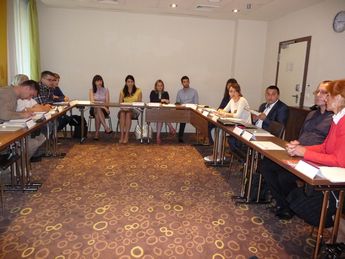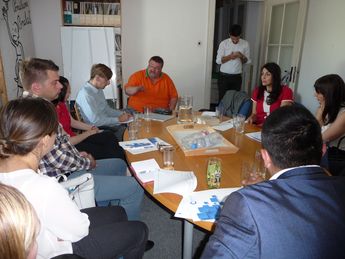Study Tour by Representatives of Montenegrin CSOs to Slovakia
On June 8-11, 2015 eleven representatives of Montenegrin CSOs participated in a study tour to the Slovak Republic with the aim of learning what the principles are of the functioning of civil society in the country.
The study tour was implemented within the project "Civil society decides too”, financed by the Delegation of the European Union to Montenegro, IPA 2013 Civil Society Facility Montenegro Programme and coordinated by the Centre for Development of Non-Governmental Organisations, Montenegro. The study tour had to contribute to the project specific objective the improvement of the cooperation between the Montenegrin government and CSOs in the process of shaping and implementing public policies. This should lead to a higher level of consultations between state bodies and CSOs, an increased number of CSO representatives in working groups for drafting public policies and an increased number of CSOs involved in public discussions.

The programme for the study tour was developed by NISPAcee experts Jana Oremova and Ludmila Gajdosova with this specific objective in mind. Within the introductory seminar, the legal basis of the functioning of the third sector and brief overview of the opportunities of third sector participation in the decision-making process were presented. During the introductory discussions, the participants expressed the numerous expectations to be fulfilled during the study visits to the selected institutions, such as the decision-making process in Slovakia, the involvement of the civil sector in the decision-making process, the system of monetary support for the third sector at central state level and regional level, and the involvement of young people in civil society activities.
The study visits were divided into two groups of institutions. The first group was the specific central state institutions with competencies in the area of civil society, such as the National Council of the Slovak Republic – Parliamentary Institute, Ministry of Finance – Institute for Financial Policy, Ministry of Interior – Department of the Internal Administration, Section of Public Administration, Council of the Government for Non-governmental and Non-profit organisations, and the Plenipotentiary of the Government for the Development of Civil Society. Included in the second group of institutions visited were various Slovak NGOs, i.e. the 1st Slovak Non-profit Service Centre, the Slovak NGDO Platform, and the Centre for Philanthropy and Association of Towns and Villages of Slovakia.

During the study visits, the participants obtained complex information regarding the legal system of civil society in Slovakia, the system for creating, registering and actions of the NGOs, historical development of the third sector in Slovakia, various types and forms of Slovak NGOs, the decision-making process in Slovakia and opportunities for involving the third sector in this, the system of financing and monetary support of the third sector from the central state and regional level in Slovakia, mainly the support from self-governments, income tax assignation and public purses, forms of cooperation between the third sector and central state bodies and regional administrations and other practical experience and advice from the Slovak experts involved regarding the actions of civil society after EU accession.

In the final part of the event, all study visits and lessons learned were discussed and evaluated. The participants really appreciated the quality of the study tour and confirmed that all their expectations had been met. They considered the actual problems of the Montenegrin civil society to be the low approximation of law in practice, missing integration and transparency of Montenegrin civil society and a regular system of financial support by the public administration or self-administration.
Regarding the most inspiring and useful Slovak law instruments, the participants considered these to be the system of income tax assignation and the legal setup of public purses. These instruments could also create the legal bases for the system of financial support for civil society in Montenegro and could solve the problem of the lack of systematic state/regional monetary assistance to the Montenegrin third sector. More information about these selected instruments will be provided in the framework of the planned final project conference in Podgorica, Montenegro in October 2015.




 Price:
Price: 








